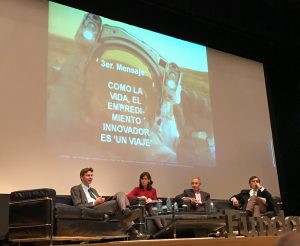 Juan Mulet, the member of IFI Innovation Council writes in Cinco Dias, one of the leading economic daily papers in Spain on how innovation, purchase and employment are, or should be, connected.
Juan Mulet, the member of IFI Innovation Council writes in Cinco Dias, one of the leading economic daily papers in Spain on how innovation, purchase and employment are, or should be, connected.
The 1987 Nobel Prize for Economics, Robert Solow, proved that the four fifths of the United States economic growth of the first half of the past century, were the consequence of having improved the way in which the production factors were combined. Back in the days it was called a technical change, nowadays we would call it “innovation in its broadest sense”, or, as the economist prefer “total productivity of the factors” (TPF). Only the remaining fifth of the mentioned growth, was attributable to the increase in the use of capital and labour. According to the OECD, between 1985 and 2010, the contribution to the (TPF) to the GDP growth between 1985 and 2010 was of 72% in Germany, of 63% in South Korea and a 52% in France. This percentage represented only a 13% in Spain. It is obvious that our economy hasn´t experience the improvement in the use of capital and labour, one of its main ways and opportunities to grow…
Read the full article in Spanish.
image©cincodias

 A lot of businesses within the digital economy are structured around the so called digital platforms. Apple, Google, Amazon and Facebook are platforms, and up to a 70% of the new unicorns, with Uber leading them, as well. In USA and Asia the companies based in platforms represent a substantial part of the new digital economy. Surprisingly, Europe, contributes just a 4% in the total capitalization of the global platforms.
A lot of businesses within the digital economy are structured around the so called digital platforms. Apple, Google, Amazon and Facebook are platforms, and up to a 70% of the new unicorns, with Uber leading them, as well. In USA and Asia the companies based in platforms represent a substantial part of the new digital economy. Surprisingly, Europe, contributes just a 4% in the total capitalization of the global platforms. A reflection of the almost finished year: at the same time that the Cotec Foundation for Innovation celebrated its “the must” spring event, near Seseña a tyre bonfire was burning full flame. Those lost tyres could have become a business opportunity, an important service for our community and to the environment. Since the 70s the MIT professor Nichols Ashford, and more recently, Andrea Renda, from the CEPS European think tank, find evidence that an adequate regulation can create innovation, particularly to face the grand societal challenges. On the contrary, an inappropriate regulation can not only worsen the emerging opportunities, but prevent the potential innovators, professionals and entrepreneurs to innovate at all.
A reflection of the almost finished year: at the same time that the Cotec Foundation for Innovation celebrated its “the must” spring event, near Seseña a tyre bonfire was burning full flame. Those lost tyres could have become a business opportunity, an important service for our community and to the environment. Since the 70s the MIT professor Nichols Ashford, and more recently, Andrea Renda, from the CEPS European think tank, find evidence that an adequate regulation can create innovation, particularly to face the grand societal challenges. On the contrary, an inappropriate regulation can not only worsen the emerging opportunities, but prevent the potential innovators, professionals and entrepreneurs to innovate at all. 1. Introduction
1. Introduction